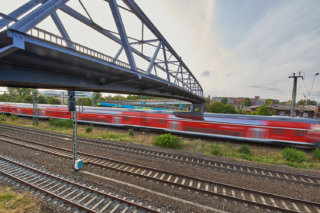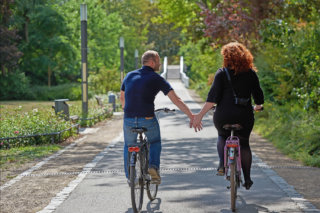The city of Brandenburg has not yet made the right leap in development
Jeannine Witt-Jentsch & Andreas Witt

Lesezeit: 10 Min.
Andreas: Because we are committed Brandenburgers. We started to work in Berlin merely a year ago. Before that, I was employed for more than ten years as an academic assistant at Brandenburg University of Technology. The city of Brandenburg has constantly been my centre of life and work. Jeannine, on the other hand, had been working outside Brandenburg since graduation. Now we both use the train to get to work. And that works very well. We have divided responsibilities: One of us takes care of the children in the morning, while the other goes to work, and therefore finishes early – and then spends time with our kids in the evening.
Jeannine: That we both became commuters was a big change for me at first. When Andreas was still working in the city of Brandenburg, I knew he could pick up the children easily in case my train got cancelled or was delayed, simply because of the proximity of his place of work and his flexible working hours. Now we must stick to a tighter schedule. But that is just something you have to get used to: We had to do some coordination, and now it’s okay. After 3 months it does not bother me at all.
We are committed Brandenburgers.
School and day-care are close to the main train station. You can pick up your daughter and son immediately after arriving in Brandenburg an der Havel. What do you do if the train is delayed or even cancelled?
Andreas: Grandparents or friends help out in an emergency and pick up the children at short notice. We are not the only parents at the school who commute and have to find a solution for unforeseen delays.
Jeannine: Fortunately, it has only happened three times, that my train was actually cancelled in the last few years. If no one has time to pick them up, we call the school or the day-care and then the children stay a little longer. Since we are not the only parents who depend on the train, the facilities are prepared for late arrivals or train cancellations. It is of course important to notify them beforehand. So far, however, we have always managed to pick up the children during opening hours. Even if it was sometimes only in the nick of time.
Jeannine, your parents moved to Jeserig near Brandenburg an der Havel at the end of 2018 to be close to you. You are both new residents – where do you originally come from?
I was born in Nauen, in Havelland. When I was seven years old, I moved to Luckenwalde with my parents. In 2002 I came to Brandenburg an der Havel to study. Even before the start of my business studies, I had friends in the city, so I already knew Brandenburg an der Havel a little bit. I chose Brandenburg University of Technology because it is relatively small and because of its familiar atmosphere.
Andreas, what was it like for you?
I was born and raised in Neuruppin in the North of the state of Brandenburg. After two years of service in the Bundeswehr, I wanted to study business informatics. Actually, in Berlin – but the diploma programme had just been cancelled there.
I remembered that professors from Brandenburg University of Technology had at one time presented the THB during graduation at my high school in Neuruppin. And that business informatics was also offered in Brandenburg an der Havel. Since THB had the same high reputation as the Berlin University of Applied Sciences, the decision to move here was an easy one. Taking a closer look, I also liked that the city of Brandenburg is – as opposed to Berlin – easy to grasp.
To live in the city of Brandenburg was our conscious decision.
How did Brandenburg an der Havel become your centre of life?
Jeannine: When I started my studies at the university, I lived in a dorm of THB, as did Andreas. In the beginning I often went to visit my parents on weekends. Gradually I stayed in Brandenburg am der Havel on the off days as well. In the first semesters Andreas and I got to know each other, and we moved into our first apartment together. Which was right across from the university. Even during our studies, we were certain that we wanted to stay in the city of Brandenburg. So, we moved to the city centre and thus close to the station – to an apartment on Gorrenberg, later to an old building in Stein Straße. After graduation, however, I first accepted a job at Deutsche Bahn in Frankfurt am Main.
Andreas: At that time, I had my job at THB and stayed in Brandenburg an der Havel. On the weekends Jeannine came home to me. To live in the city of Brandenburg was our conscious decision and we were sure that Jeannine would eventually work in the Berlin-Brandenburg area again.
Why didn’t you move to Berlin?
Andreas: During our studies we had part-time jobs in Berlin and were able to compare the cities of Berlin and Brandenburg based on first-hand experiences. In Brandenburg an der Havel you have everything you need. In addition, the costs of living here are lower and the city of Brandenburg offers a great advantage: You can really unwind here.
Jeannine: I really like Berlin, but I don’t want to live there. I couldn’t imagine it in the past, and now certainly not, when I think about what is best for my family.
What is it you especially like about Brandenburg an der Havel?
Andreas: In addition to the general quality of life, due to short distances as well as the many green areas and the water that is present everywhere, the city benefits from its proximity to Berlin. Because of its good connections to the Berlin labour market with employment opportunities in all fields of work, Brandenburg an der Havel is a more than acceptable alternative for living. You know, just because you live in Berlin does not mean that you get to work faster there. I like to speak in favour of the city of Brandenburg to my Berlin colleagues when they are once again complaining about their arduous commute to work. If you get to know Brandenburg an der Havel and visit the city, then falling in love with it is easy.
How did you, as a student, spend your free time?
Andreas: During the week we studied (laughs) and worked. On weekends we visited events offered by THB, for example in the field of water sports. We rented a canoe and paddled through the waters of the river Havel and Beetzsee. In addition, several fellow students also stayed in the city on weekends. Together we explored the surroundings of Brandenburg an der Havel, in the evening we went to the student club on campus.
My favourite place is our home.
What do you do today as a couple and as a family in your free time? Do you have favourite places in the city of Brandenburg?
Jeannine: My favourite place is our home. In 2017 we bought a townhouse near Jahrtausendbrücke. We spend a lot of time in our garden. But we also go out for walks, for example on Marienberg, along the city canal or visit with our children the playgrounds at Heinrich-Heine-Ufer and on Packhof. It feels a little like holiday when we are on our small boat on the Havel. Floating on the river is very relaxing and it is even possible for the four of us to spend a night or two on the water.
Andreas: We also like to go to Theaterpark. We regularly visit the annual radio play weekend in August there.
How important is it to you as a family to live in the city centre?
Andreas: For us as commuters, the proximity to the main station is of great importance. In addition, most restaurants are in the city centre of Brandenburg an der Havel and we can do our shopping here. Even though we have a car, we rarely use it.
Jeannine: I think it’s nice that our children don’t need to get on a bus to get to school. And we don’t have to drive them back and forth. They can walk or ride their bikes. This is a good way for them to become more independent.
You first encountered Brandenburg an der Havel as a student and now as a family. How has the city developed in your opinion?
Andreas: When I first drove through the city (2002) by car, past the main train station, I was disheartened. However, a great deal has already happened during our studies, for example, the city centre has changed a lot in the last ten years. The reconstruction of the main station has also had a positive effect. Arriving in the city as a commuter or tourist, you no longer look at GDR concrete, but at modern architecture.
Jeannine: In the run-up to BUGA 2015, many changes became visible. That’s when I realized how proud I am of the city. In the meantime, I enjoy showing Brandenburg an der Havel to our friends from outside. They confirm my impression that the city has become attractive. It would not occur to most people that there is so much beauty to be found here.
Andreas: True. There are only a few unrenovated houses left.
Jeannine: However, the city should rethink its policies concerning the shops in the city centre. The current shopping opportunities do not offer enough variety for me. I have the impression that it is difficult for property owners to rent out commercial space. And more people are needed who dare to run a shop. If there was a little more variety, it would be even nicer. Brandenburg an der Havel has not yet made the right leap in development. It has become nicer on the outside, but there should be more cultural events and enterprises. It is possible to go out in the evening, but for me there is nothing (laughs).
So far, commuting to Berlin works for you. Can you imagine working in Brandenburg an der Havel?
Jeannine: If I would get a job in the city of Brandenburg that offers equal prospects with similar pay – of course. I wouldn’t even mind if I had to change my line of work. Now, however, I can’t think of an employer who provides the same benefits as my current employer – be it flexitime, home office, pension contributions or time accounts where working hours can be saved for days off. Perhaps companies in the city of Brandenburg are not aware that these working models exist, or they just do not communicate them sufficiently.
Andreas: Just knowing that a sabbatical would be possible – without necessarily wanting to take one – is important to me. However, a company must be of a certain size to be able to finance such benefits. A sabbatical means lost time. A company has to have a team that is large enough to cover that. But such companies are rare in the city of Brandenburg or I am not aware of any. Now however, there is such a high demand in the labour market that employers have to make certain allowances to get the workforce they need. As a result, there is hardly anything that is not negotiable.
Jeannine: Maybe we will have to wait another five years before it becomes even harder for companies to find highly qualified employees or till their current employees reach retirement age. Employers in the city of Brandenburg will then also become more flexible.
Andreas: Living and working in Brandenburg would be attractive. I frequently check job offers online on transregional platforms. On LinkedIn, for example, I have subscribed to suitable local job offers. So far, however, nothing has come up for me as a product manager in the region.
Right now, I feel like I am in a good place.
Andreas, you were already self-employed in addition to your work at the Technical University. Now you have a permanent job. Is self-employment still an issue for you?
Andreas: The employment at THB in combination with freelance work was an extreme workload but had the advantage of flexibility and freedom. However, I got to the point where I didn’t see any possibilities for development. After ten years, I had to decide whether I wanted to stay a freelancer or become a regular employee with all consequences. I chose regular employment because there I saw possibility for development. It was important to me to work strategically and on a long-term basis in a team and to learn new things in this environment. Right now, I feel like I am in a good place and at the same time I am aware of the challenge.
Your employers make home office days possible. Andreas, you work one day a week from home, Jeannine up to three days a week. Are you interested in co-working places or a public workplace?
Andreas: Working in home office is fine. I could imagine working in a café with Wi-Fi from time to time, but not as a permanent solution – you need appropriate furniture and equipment. You can’t find that in any cafés in Brandenburg an der Havel. A co-working space could be interesting if meeting rooms would be included.
Is there anything you miss in the city?
Andreas: Sometimes in the evening, when I return from Berlin, public transport services are not available. Then I just walk home. The timing of the buses and trains at the weekend is not synced. But I don’t miss anything here.
Jeannine: My quality of life would greatly improve if I had the opportunity to work in Brandenburg an der Havel. The city could also be a little more bicycle-friendly. Our children are still allowed to ride on the sidewalk, but when they are older, they will have to use the road. I don’t like the thought of that. On the one hand because of the road surfaces are in bad shape, on the other because most drivers lack consideration.
If you could wish for something for the city, what would it be?
Andreas: Another positive economic development with new companies settling here and more shops in the city centre. I have the feeling that the people who could be good customers do not live in the city centre where they could spend their money. This financial power is still missing.
Jeannine: The city will automatically evolve as a result of the expansion of Berlin. In my opinion, the influence of Berlin on Brandenburg an der Havel is not so meaningful yet, but that will change in the next five to ten years. Berlin is bursting at the seams and trains will be scheduled in shorter intervals in 2023 – which will be a big boost. I don’t know yet if I’m happy about this prospect. I hope that Brandenburg an der Havel will continue to develop, especially in the cultural field. More exhibitions or venues where concerts take place or more cinemas would be great. I fear that over time the charm of the city of Brandenburg will be lost. Similar to Berlin. That the people who move to Brandenburg an der Havel may not be able or willing to identify with the city.













